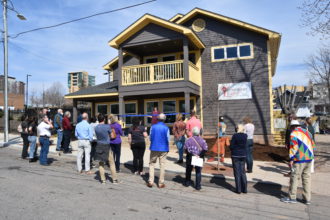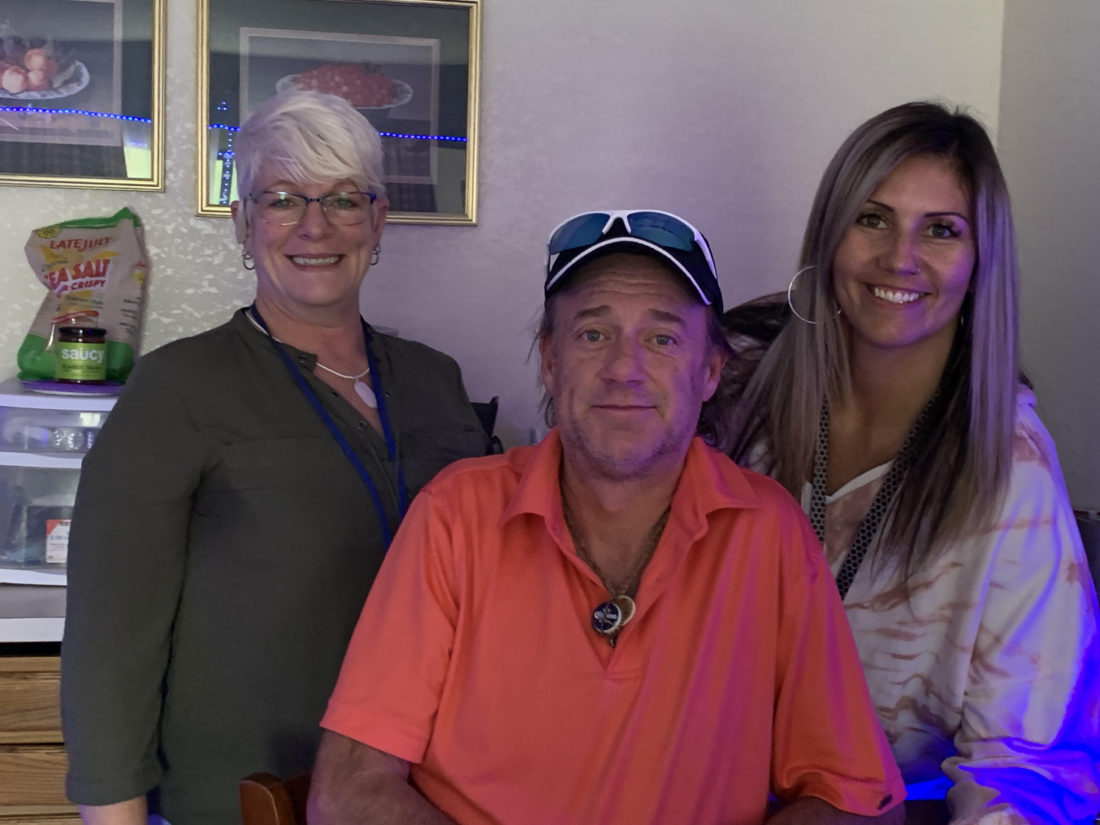Food, clothing, a roof to sleep under and access to financial, mental health and medical resources are vital services that area nonprofits do a good job at providing. But to move clients from reliance on those services to self-sufficiency, homeless advocates say, community support and permanent affordable housing are key — and their lack is the main barrier to reducing the homeless population in Asheville.
Kat Douglas and Ashley Lung were homeless residents addicted to drugs who ended up in prison after living on the streets. Both now work full time for Sunrise Community for Recovery and Wellness and have their own homes. Lung is the director at the temporary homeless shelter at the Ramada Inn in East Asheville, which the city of Asheville is under contract to purchase as a permanent low-barrier shelter; Douglas is a peer support specialist who goes wherever she’s needed.
Both say the support they got (and continue to get) from their peers has helped them make better choices. “Example is so important,” Lung says. And both are happy to be self-sufficient and working with others whom they call peers. “I’m happy for the first time in my life,” says Douglas.
And Sunni Morgan has become a full-time intake case manager at Homeward Bound’s AHOPE Day Center in downtown Asheville after living on the streets four years ago. She started volunteering with nonprofit BeLoved Asheville when she was still homeless and found a room to share with another volunteer. Once she started getting peer support from Sunrise and taking advantage of the services provided by Homeward Bound, she too began making better choices.
“People get discouraged because everything is so slow,” Morgan says. “It took about 3 1/2 years, but I snatched [every opportunity] I could. I went through a kind of forced patience. I still have friends on the street, and it gets frustrating sometimes that they don’t take advantage of the services available.”
What comes first?
Leaders in the homeless services community say that support from people who have lived through hard times and come out the other side makes all the difference in helping folks move from homelessness to permanent, self-supporting housing.
Asheville Buncombe Community Christian Ministry runs two homeless shelters in the area, Veterans Restoration Quarters and Transformation Village. While the nonprofit offers services such as housing and life skills classes, job training, financial guidance and medical support, the Rev. Scott Rogers says engagement with community drives fundamental change in people’s lives.
“Homelessness creates isolation. And unresolved traumas make folks vulnerable to abuse,” says Rogers, ABCCM’s executive director. “Being around people who aren’t abusive breaks the isolation. Then they can learn about healthy choices others have made.”

Kate Caton, homeless services director at Homeward Bound, agrees. “As we provide the wraparound services necessary to get people into stable housing, we build relationships,” she says. “At AHOPE, it’s a place to be recognized. We try to get to know as many people as we can by name.”
Visitors to the day center are more open to hearing their options, she adds, when they feel accepted and not judged. That comfort puts them in a better place to consider housing, work and medical and mental health services.
Through the cracks
When Lisa Tucci-Caselli got out of the Western Correctional Center for Women in Swannanoa, she landed on a friend’s sofa for a year or so while she picked up part-time jobs. As someone who formerly abused drugs, she knew she couldn’t go back to familiar people and places or she’d end up using again and land back in prison. Two years later, she’s now couch surfing with extended family in Sylva.
Tucci-Caselli describes shelters as a “Catch-22”: While the environment encourages better behavior, she says, “It’s tough to be confident when you have a mirror held up to you every day, feeling like you’re in active addiction again.”
She worked part time with Homeward Bound in 2020 and often slept in her car between shifts. Despite that employment, Tucci-Caselli says, she wasn’t able to find permanent housing. “Even if I got more hours, there’s nothing I could afford in Asheville,” she explains.
Tucci-Caselli says she would move into the Ramada Inn, but the shelter is currently full. She tries to keep positive and appreciates the support that’s available, but doesn’t know where to turn next.
Mark Czarnecki has lived at the Western Carolina Rescue Ministries for three years. He says he gets food, a place to sleep, community involvement and spiritual support at the Asheville shelter. And he has plenty of part-time jobs. “There’s just no place in Asheville that I can afford,” he says.
Bread and barriers
Food and shelter are generally available for those who get connected through their fellows on the street or organizations offering services. But a lack of affordable, long-term housing is a main barrier to ending the plight that poverty too often brings.
Caton from Homeward Bound says that her organization works with landlords to accept federal housing vouchers, which provide rent assistance for disabled, elderly and low-income people. Yet many are reluctant to accept them, even when the nonprofit provides continued case management and helps with rent when needed. “There’s a stigma to being homeless and a negative connotation to vouchers. But given a chance, most people can make it,” she says.
Caton argues that such judgment is misplaced because many people receive subsidized housing in some form or another, at least for a while. “I wouldn’t be able to live in the house I have if I wasn’t married,” she says. “For most people, if they didn’t have roommates, partners, family or government funds to help, they might be homeless too.”
Lung at Sunrise says people staying in shelters often have vouchers in hand but still can’t find a place to live. Another big barrier she encounters when trying to get folks into permanent housing is the criminal background that many people without homes have. That’s why she feels so strongly about the need for low-barrier shelters, landlords and peers who don’t hold a person’s past against them.
“We all make mistakes,” she says. “And there are so many great agencies that we partner with to provide the different services people need to get back to being self-supporting. But when people without homes can’t get an ID, don’t have a phone where they can take calls about jobs and then don’t have anyone willing to rent them an apartment, it’s no wonder people get frustrated.”
Most people without stable housing want to find a place to live, a job that pays the bills and a place within a supportive community, says Caton. “Only a very small percentage aren’t interested.” When asked which comes first — a job or a home — the overwhelming consensus is that housing must be the priority.
“It’s hard to find a job if you don’t have a place to live,” says Tucci-Caselli. “And it’s almost worse if you have some work, but not enough to pay rent. If I had a safe place to live in Asheville, I know I could make it with support from my peers.”



Ashley Lung I love you thanks for being such an amazing sponsor and role model to me and peer!!! What you do to help the community is so desparetly needed and I am so proud of you!!! 💜💜💜
#wedorecover